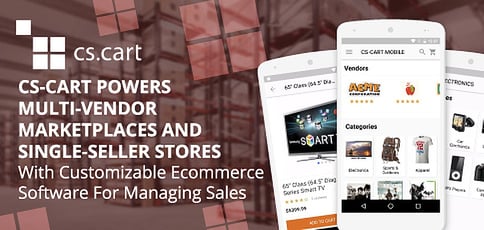
TL; DR: Behind a mantra of constantly developing and never settling, CS-Cart helps online retailers explore the difference between running a web-based boutique or running an entire marketplace with its smart and easy-to-use Multi-Vendor eCommerce software. The company is behind more than 35,000 single-seller stores and markets since 2005 and touts a feature-rich, open-source solution that helps entrepreneurs capture a slice of more than $1 trillion in annual eCommerce sales.
Why start a single online store when you can start the next eBay or Etsy?
Online shopping malls, which can feature anywhere from dozens to thousands of retailers, typically offer more diverse products and better prices — making them more appealing places for potential customers to explore. With its Multi-Vendor eCommerce platform, CS-Cart empowers business owners to launch and scale what could become the next Amazon.
However, entrepreneurs don’t need to shoot for the moon to find success with CS-Cart Multi-Vendor, according to Sales Manager Anna Basyrova. The platform’s rich feature-set and simple interface enable a variety of sellers to showcase their work to the ideal audience.
“It’s changing the concept of a marketplace,” she said of Multi-Vendor. “A marketplace is not a huge, multi-seller store anymore. Sometimes it’s a local market of farmers or artisans who would like to sell their products in their state or city only.”
While a large online store could have hundreds of thousands of SKUs, Anna has seen CS-Cart succeed with comparatively few products.
“Despite the fact that creating a marketplace involves a lot of hard work, there are more and more people who are interested in creating this kind of online project in particular,” she said. “The great thing is that our solution is so flexible that it will work for any size marketplace, problem-free.”
The Path From Small Biz Startup to Global eCommerce Enterprise
Today employing 130 team members and growing across the globe, CS-Cart understands something about start-from-scratch entrepreneurship: When the company started in 2005, a tiny team of three developers operated on a shoestring budget.
“One of the founders even had to sell his car to get money to start the business,” Anna said.

From the beginning, CS-Cart developers have emphasized a clean, open codebase.
CS-Cart’s founders, developers in an emerging eCommerce industry, saw an opportunity to leverage their collective knowledge and ambition to create a high-quality, standalone eCommerce software geared toward small- to medium-sized businesses where the entrepreneur was also in charge of establishing the online store.
The team took roughly six months to create the first version of CS-Cart, with much of the credit going to Ilya Shalnev for creating a sound and clean codebase that enabled the company to nimbly build, adapt, and grow.
“It was him who led them in the right direction, which is now one of CS-Cart’s strong points: clear source code,” Anna said. “A logical and clear architecture helped them to modify the code and add required features.”
The CS-Cart source code is completely open, enabling experienced developers to completely customize their marketplaces. Coupled with the technical prowess, the CS-Cart Co-Founders also emphasized design and user experience early in the platform’s creation.
“They also understood that a store’s interface needs to be easy to interact with, both from store management and customer experience,” Anna said. “As the face of a business, CS-Cart has an easy and very user-friendly admin panel that helps CS-Cart stand out.”
Enabling Entrepreneurs to Open a Single Store or Massive Market
The ascendency of Amazon, eBay, and other sprawling internet marketplaces have significantly influenced consumer behavior over the last two decades, as online shopping becomes the new norm for everything from everyday household items to handmade crafts.
“It’s no secret that most online shoppers in the US don’t just Google products, but they go to Amazon straight away when they are looking for something,” Anna said.
Multiple storefronts are available for merchants operating under the single-seller CS-Cart software. This way, a store owner can open more storefronts and make them look like separate unique stores and manage them all via a single admin panel. While the CS-Cart Multi-Vendor solution doesn’t support multiple storefronts, vendors can create multiple micro-stores. This allows each vendor to showcase products both on a shared marketplace storefront and in a micro-store.

CS-Cart customers can get help setting up their store and can rely on robust documentation and community forums.
Marketplace owners can get started with the Multi-Vendor layout manager, a drag-and-drop site builder that enables store owners to design their online shopping destination without code. From there, Multi-Vendor also coordinates vendor plans, communication, stores, reports, and statistics.
“Our main feature is the set of features you get by default,” Anna said, adding that Multi-Vendor comes with more than 500 features. “It means no extra payments. The saved budget can then be spent on something even more important than some technical aspects of a business, like marketing.”
Whether the business itself is large or small, Multi-Vendor puts power in the business owner’s hands to manage sellers at any scale. The UK family-oriented marketplace Yumbles focuses on serving local customers, while the Indian site Shopclues has grown to more than 1,000 employees, 500,000 merchants, and 53 million products.
“We are constantly developing and never settle,” Anna said. “That’s the key.”
CS-Cart’s Marketplace Toolbox is Functional, Creative, and Easy to Use
At one point in CS-Cart’s history, according to Anna, the team was pleased with how successful their single-store product was performing — but stumped as to why Multi-Vendor wasn’t taking off as expected.
“We analyzed all our major competitors in the market and made a thorough comparison of all the features we did and didn’t have,” she said. “It turned out that, though we had some great functionality, potential users sometimes passed over them for tools that were of a higher priority to them.”

CS-Cart developers continue to add onto more than 500 existing features in the platform.
CS-Cart developers quickly got to work rolling out popular user tools like Stripe Connect, vendor plans, and more.
“The month the new version was released, Multi-Vendor license sales doubled,” Anna said. “The growth is continuing from there.”
CS-Cart’s goal, Basyrova said, is to ease the burden on business owners who are trying to manage their online store on their own — with or without web savvy. With products like CS-Cart and Multi-Vendor, business owners can focus on marketing strategies and other details central to their business while the eCommerce software keeps the online storefront running smoothly.
“These tools allow you to start and develop your project successfully,” Anna said.
What’s New: PayPal, Mobile Access, and Checkout Features
CS-Cart developers constantly collect customer feedback through messages to the sales and customer service departments, as well as community forums. This feedback, Anna said, is what drives and inspires the team to implement new features and improvements as it releases three or four major updates each year.
Among the customer-requested features in the works for CS-Cart and Multi-Vendor: separate checkouts for each vendor, configurable forms to become a seller, enhanced promotional optimization tools, and a re-factoring geared toward simplifying and modernizing the checkout process. Also included in the package is the PayPal for Marketplaces feature, and a mobile app has recently been made available for purchasing.
Through the “What’s New in Multi-Vendor” forum, CS-Cart invites users to test demos such as the drag-and-drop product images tool and to leave feedback for developers as they work to unveil updated versions of CS-Cart’s eCommerce platforms.
“Our goal is to extend the global eCommerce community, and to educate marketplace owners to help their projects become a real success,” Anna said.
HostingAdvice.com is a free online resource that offers valuable content and comparison services to users. To keep this resource 100% free, we receive compensation from many of the offers listed on the site. Along with key review factors, this compensation may impact how and where products appear across the site (including, for example, the order in which they appear). HostingAdvice.com does not include the entire universe of available offers. Editorial opinions expressed on the site are strictly our own and are not provided, endorsed, or approved by advertisers.
Our site is committed to publishing independent, accurate content guided by strict editorial guidelines. Before articles and reviews are published on our site, they undergo a thorough review process performed by a team of independent editors and subject-matter experts to ensure the content’s accuracy, timeliness, and impartiality. Our editorial team is separate and independent of our site’s advertisers, and the opinions they express on our site are their own. To read more about our team members and their editorial backgrounds, please visit our site’s About page.

